James D. Forbes Collecting Prize 2018 Winner
We are happy to announce that the winner of the James D. Forbes Collecting Prize 2018 is Parker Gordon, PhD candidate in the School of English. In this blog, Parker tells us about his winning collection. From today until Thursday, there will be a display of the items selected for the Library’s Special Collections by previous winners of the prize, including Parker’s choice, on level 2 of the Main Library. There will also be a drop in session on Wednesday 17 April on Level 2 of the Main Library between 2-3 pm for those interested in learning more about the James D. Forbes Collecting Prize Competition.
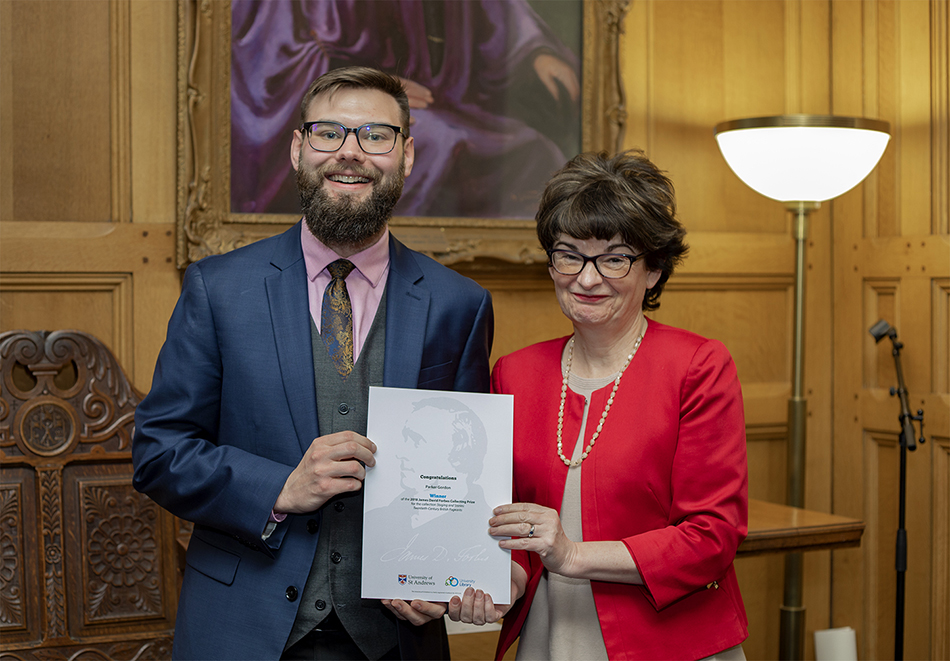
I am honoured that my collection of twentieth-century pageant items was selected for the 2018 James D. Forbes Collecting Prize. I began this collection as an extension of my PhD research into inter-war British pageant collaborations between writers and composers. In the first half of the twentieth century, pageants emerged as a local and amateur form of outdoor theatre on a massive scale that attracted the talents of writers, composers, and actors such as Virginia Woolf, E. M. Forster, T. S. Eliot, Cicely Hamilton, Gustav Holst, Ralph Vaughan Williams, Martin Shaw, Edward Elgar, Edith Craig, Ellen Terry, Laurence Irving, and F. R. Benson.
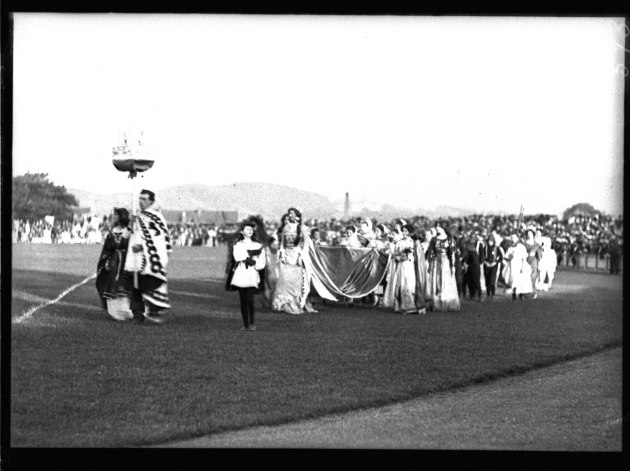
Although now largely forgotten, hundreds of pageants from 1905 until the 1950s were commissioned and performed in the UK; the volunteer casts would often range from 300 to 3,000 (often including children and livestock!) – with some as large as 15,000. A couple of pageants in London were even seen by audiences of about 1,000,000 people across the performance run. For some fascinating video footage of pageants, check out the National Library of Scotland’s Moving Image Archive.
These were immensely popular entertainments, presenting local and national history on an epic scale, and choice seats could easily cost as much as an expensive ticket to a high-profile concert today. Due to their large size and the frequent necessity for outdoor performance, audiences could rarely hear every word of the spoken dialogue, and, therefore, pageant handbooks were written and sold so that audience members could read about the pageant in advance and follow along.
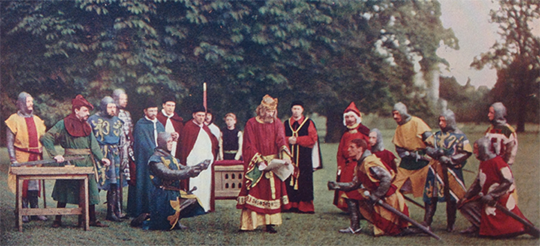
These were most certainly not programmes. A pageant handbook would often include essays commissioned by eminent historians, explanatory notes on the historical sources consulted during research for the pageant episodes, special poems to introduce the pageant, and photographs and/or illustrations. In a few pageant books, the music was arranged and reproduced for personal enjoyment at the home piano long after the pageant had finished. Yet for all the seriousness of these handsome and weighty volumes (often costing half a crown in the early 1900s – roughly £10-15 today), there is a subtle tongue-in-cheek humour and cheekiness just below the surface of these handbooks.
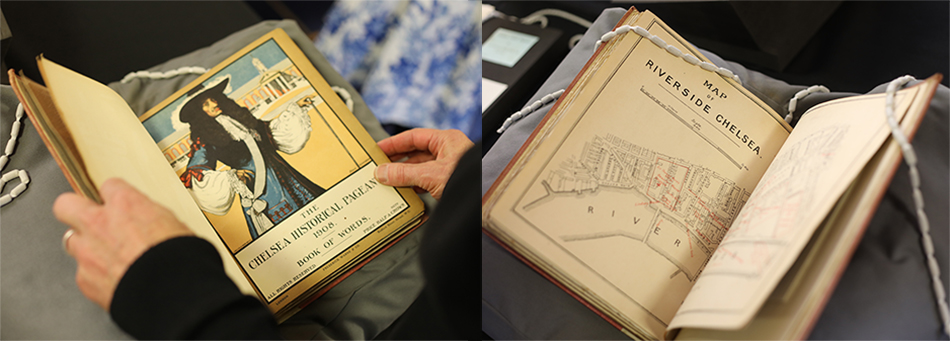
‘Where discrepancies are found between the dialogue as delivered by the actors, and the Episode as printed in this book, they are due to the obvious necessity of compression and revision which always arises at the rehearsals of any dialogue intended for dramatic presentation. In some cases, … these divergencies are very wide, because what is extremely interesting to read may often prove in actual presentation somewhat ineffective, owing to the difficulties of speaking such dialogue in the open air, and in a very much larger area than that to which the actor is accustomed’ (viii).
A pageant handbook served as a guide in preparation for seeing the pageant and as a souvenir to be enjoyed and reread after the pageant was finished. Many pageants were only performed 2-4 times and never again (the Library holds copies of books from the nearby pageants of Dundee and Arbroath). Because of this limited performance history, pageant handbooks are our closest connection to these community events. These books were sold as a way of promoting the pageant and would also be available to purchase at the pageant arena on the day – audience members would have these books with them whilst attending a pageant.
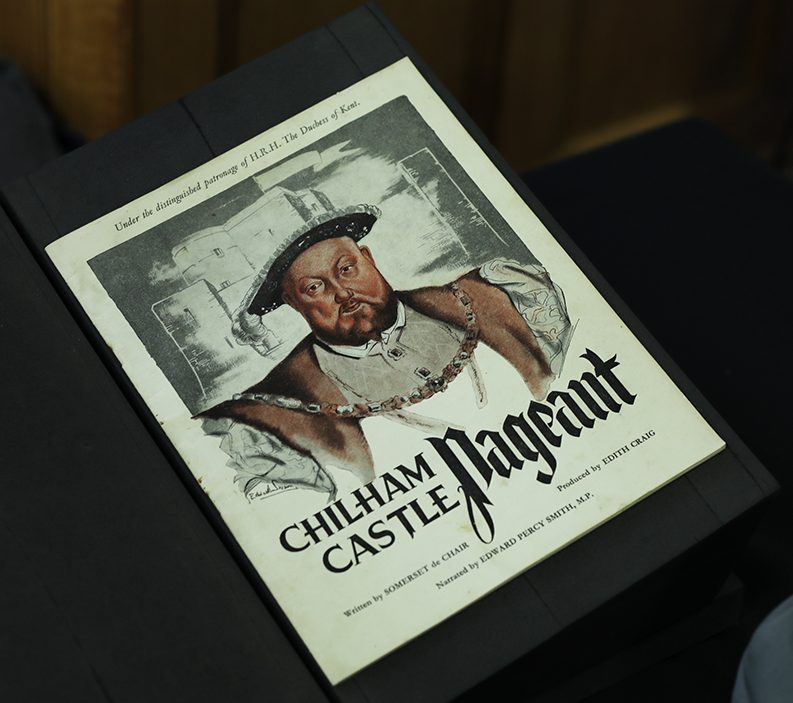
One of the items in my collection, the handbook for Edith Craig’s Chilham Castle Pageant (1946) also had the original ticket tucked within its pages. Often, pageant materials can be found rather affordably through online vendors, but if lucky, a unique item can be found in a local second-hand bookshop. I found this 1930s costume catalogue (below) in Stratford-upon-Avon and was thrilled to notice that these costumes were advertised to pageant makers. Pageant costumes were meticulously researched and often specially made so that the pageant characters could be portrayed as accurately as possible.
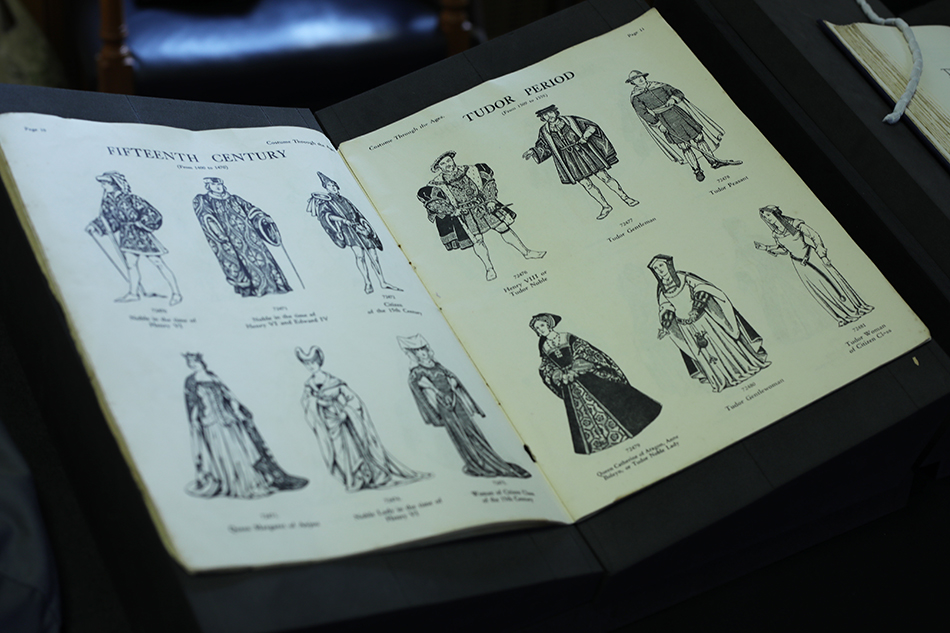
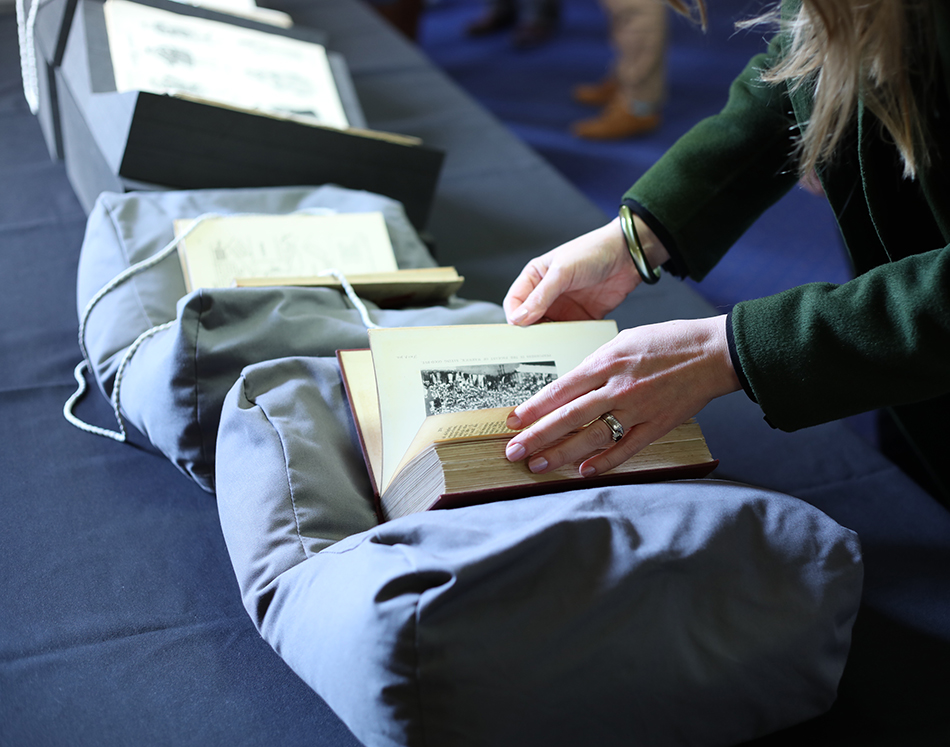 As I began collecting pageant memorabilia, I tried to find unique items that had an extra special something in connection to the pageant. My first impression copy of T. S. Eliot’s The Rock (1934) includes the small paper insert from the publisher Faber & Faber, which explains the historical references made within an iconoclasm scene. One of the first items I purchased was the autobiography of the pageant’s founder, the dramatist and composer Louis N. Parker; my copy is signed and dedicated to one of the women who helped produce his pageants. This copy also includes several newspaper clippings. I also found a copy of Charles Williams’s Judgement of Chelmsford (1939/1946), which includes a small card explaining that the proceeds from the pageant play are to benefit the Bishop of Chelmsford’s appeal for £300,000 to support post-war needs.
As I began collecting pageant memorabilia, I tried to find unique items that had an extra special something in connection to the pageant. My first impression copy of T. S. Eliot’s The Rock (1934) includes the small paper insert from the publisher Faber & Faber, which explains the historical references made within an iconoclasm scene. One of the first items I purchased was the autobiography of the pageant’s founder, the dramatist and composer Louis N. Parker; my copy is signed and dedicated to one of the women who helped produce his pageants. This copy also includes several newspaper clippings. I also found a copy of Charles Williams’s Judgement of Chelmsford (1939/1946), which includes a small card explaining that the proceeds from the pageant play are to benefit the Bishop of Chelmsford’s appeal for £300,000 to support post-war needs.
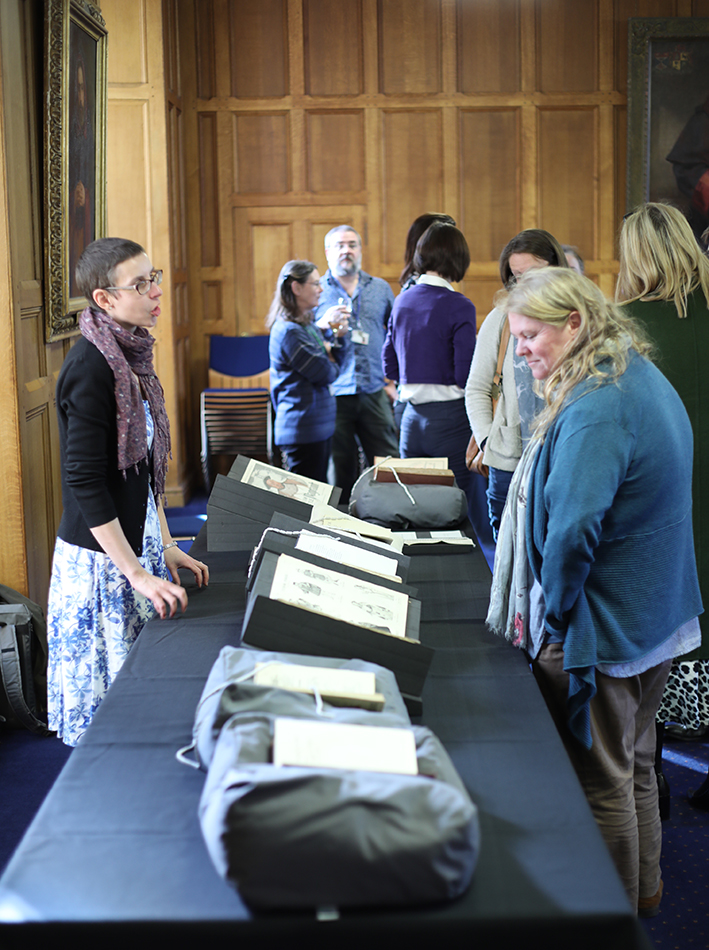
Perhaps my favourite items in the collection are the ‘how to’ manuals for creating and producing your own pageant. In addition to the actual pageant handbooks and the supplementary materials that were sold as souvenirs, such as sheet music, photograph postcards and picture books, there were several books published to encourage people to produce their own pageants. These step-by-step guides, written by some of the most prolific pageant masters of the day, encouraged people to write and produce a pageant for their own town or village. Filled with humorous anecdotes of successes and epic failures (often relating to the English summer rains), these ‘how to’ manuals are an intimate glimpse into the realities of trying to organize an amateur dramatic production with hundreds (or thousands) of people involved.
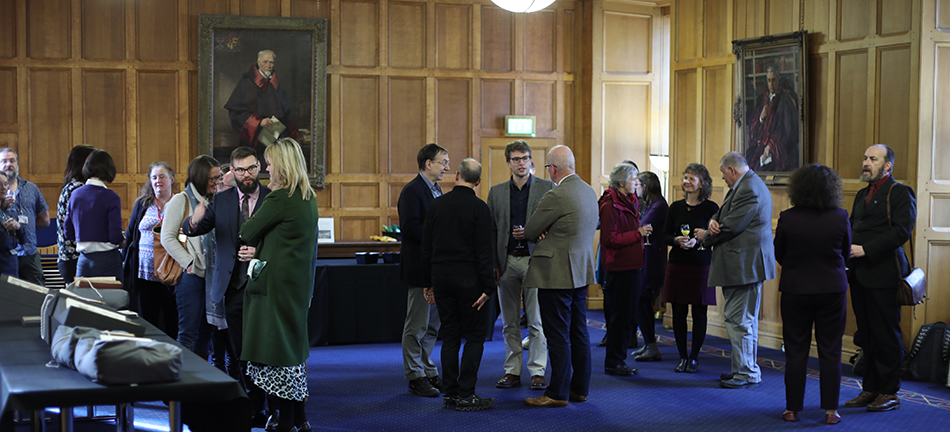
I am grateful to the Rare Books team for their assistance and guidance in purchasing a unique presentation copy of the Chelsea Historical Pageant (1908) for the Special Collections Library with funds from the James D. Forbes Collecting Prize. This fascinating book includes newspaper clippings, notes from the pageant organizing committee, illustrations, maps, photographs, and the music that was specially composed for the pageant. The Rare Books team has also provided invaluable expertise and assistance in the preservation of my collection; careful handling and storage is incredibly important for any rare or fragile material. Pageant books help us learn more about this completely neglected and forgotten era of British theatre history, and many pageant materials are quite affordable, easily providing a rare connection to the past. In the concluding remarks of the Chelsea Pageant Committee, pageant books ‘will, no doubt, be worth much in years to come, and all who can should possess themselves of copies while the opportunity remains’.
Parker Gordon
PhD Student, School of English
Biography
Parker T. Gordon is a PhD student in the School of English, supervised by Emma Sutton and Michael Downes. His research into literary and musical collaborations for pageants has led to several exciting rediscoveries, including the full score of Martin Shaw’s music for T. S. Eliot’s The Rock (1934). Parker premiered his own arrangements of the music at a Music Centre Music Talk in November 2018, with the composer’s granddaughter in the audience. A pageant conference will take place in St Andrews on 17 June 2019 with a free recital featuring more music from The Rock and a display of pageant items from the University Library’s Special Collections.
Here is the article.